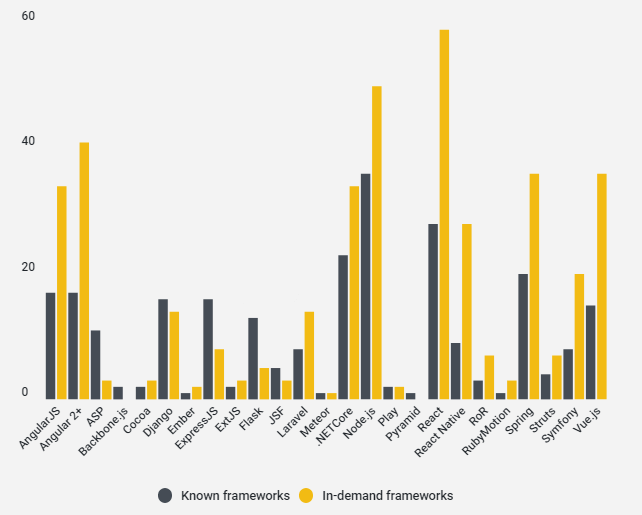Highlights From The 2021 Developer Survey
in DevOps , Programming

The 2021 edition of the CodinGame developer survey shines its spotlight on the reality of the developer's career, the rise in salary of some tech roles, and the general preference of developers and HRs when looking out for jobs/tech talents.
CodinGame is a tech company providing a platform for developers to hone their coding skills by programming puzzles. It also provides a feature that connects developers with potential employers.
Since 2018, the company has conducted an annual survey that asks developers and tech recruiters about their priorities, challenges, preferred technologies, and employment information.
The 2021 edition of the CodinGame developer survey reveals trends in tech hirings, technologies, experience, demand, and recruitment of tech talents by analyzing results from over 15,000 developers and HR professionals across different geographic locations.
Notable highlights
Below are some of the notable highlights of the survey.
33% of the survey respondents confirm that they are self-taught developers, learning from online resources, books, tutorials, YouTube, and so on. A cumulative 58.8% learned to code formally with 43% going to University and 15% saying that they learned at school. None of the respondents consider that they learned to code on the job.
79% of tech recruiters agree that they already recruit coders with no formal academic background while 24% say they do that regularly.
Similar to the 2021 StackOverflow developer survey, JavaScript keeps the lead as the most-known programming language followed by Java (59%) and Python (57%), with more than half of the survey respondents knowing how to code in at least one of these three languages. It is worth noting that the trio has kept the top three spots in this category locked since the first edition of the CodinGame developer survey.
Developers using the languages, JavaScript (62%) and Java (59%) are in much higher demand compared to other languages like Python (48%), C (15%), or C++ (27%).
Even though only 27.6% of the survey respondents say they know how to use React.js, the open-source javascript library is the most sought-after framework (59%) by recruiters. Node.js is the second most sought-after framework followed by Angular 2+(41%).
Node.js (36%), React.js (28%), and .NET Core (23%) are the first, second, and third most popular frameworks in the category.
CodinGame asked its HR respondents how many developers they planned on recruiting in 2021. 64% reveal that their companies are looking to hire up to 50 developers this year. 8% say they are looking to hire between 100 and 500 while 5% say over 500.
Despite the difficulty and uncertainty, the pandemic threw into the general workforce, developers are confident of their ability to change jobs as a developer at any time. on a scale of 1 to 10, respondents of the survey chose an average answer of 7.
When asked: Which positions do you think you’ll struggle to source/recruit in 2021?
43% The survey HR respondents predict that they’ll struggle with hiring talents for the DevOps role. Backend developer (41%) and Fullstack developer (41%) follow.
55% of the HR says candidate experience is what they will be willing to invest in in 2021. 49% chose talent retention and 43%, employer branding as their priorities for 2021.
The survey also reveals that developers working in the Security industry are the highest-paid ($55,598) followed by Technology ($55,556), Insurance ($54,188), and Energy ($53,936) industries.
Developers working in Pubic administration ($40,537) and IT services ($38,304) industries are the least-paid on the list.
For the second year in a row, Software Architect ($74,585) is the highest paying tech position followed by Data Scientist ($55,695). DevOps salary follows at $54,118 making it the third highest-paying tech role in 2021. Other tech positions in this category include software developer ($51,942), Embedded software engineer ($49,955), Back-end developer ($48,647), and Full-stack developer ($44,759).
44% of developers are looking for international job opportunities, 42% are looking for regional opportunities while 33% are willing to relocate nation/state-wide.
The majority of developers (43%) prefer to work "few remote days a week", 24% want to work 100% remote and only 5% are willing to work 100% at the office.
HR also supports this with 53% offering developers to work remotely "a few days a week", and 48% offering a 100% remote role.
Developers say technical challenges, flexible working hours, and salary are the three things that matter to them most when considering a job offer. While HRs say technical challenges to solve, developers’ salary, and the company's tech stack are what they are looking out for when offering a job role.
HR professionals listed finding qualified candidates, standing out from other companies, aligning with hiring manager's demands, and recruiting within tight timeframes as some of their biggest challenges when recruiting developers.
Almost all developer respondents (78%) say LinkedIn is their go-to platform when looking for job opportunities. While HRs also majorly refer to LinkedIn when sourcing for developers, they also look into tech conferences to catch talents that suit their criteria.
What do you dislike about the recruitment process?
50% of developers say they dislike being targeted with irrelevant job offers, lack of feedback after interviews, irrelevant technical interview questions and exercises, and HR professionals who don’t understand tech.
Developers and HR professionals prefer traditional face-to-face interviews, informal interviews, and live coding interviews. HRs appear to also like video conferencing interviews but developers dread it.
45% of the survey respondents think remote tech interviews are gradually becoming the new standard while 48% think otherwise.
Developers chose hands-on assessment tests with real coding questions, live coding interviews, and non-boring technical tests with challenges and/or games as their top 3 most preferred technical assessment processes.
Get similar stories in your inbox weekly, for free
Share this story:

The Chief I/O
The team behind this website. We help IT leaders, decision-makers and IT professionals understand topics like Distributed Computing, AIOps & Cloud Native
Latest stories
Best Cloud Hosting in the USA
This article explores five notable cloud hosting offers in the USA in a detailed way.
Best Dedicated Hosting in the USA
In this article, we explore 5 of the best dedicated hosting providers in the USA: …
The best tools for bare metal automation that people actually use
Bare metal automation turns slow, error-prone server installs into repeatable, API-driven workflows by combining provisioning, …
HIPAA and PCI DSS Hosting for SMBs: How to Choose the Right Provider
HIPAA protects patient data; PCI DSS protects payment data. Many small and mid-sized businesses now …
The Rise of GPUOps: Where Infrastructure Meets Thermodynamics
GPUs used to be a line item. Now they're the heartbeat of modern infrastructure.
Top Bare-Metal Hosting Providers in the USA
In a cloud-first world, certain workloads still require full control over hardware. High-performance computing, latency-sensitive …
Top 8 Cloud GPU Providers for AI and Machine Learning
As AI and machine learning workloads grow in complexity and scale, the need for powerful, …
How ManageEngine Applications Manager Can Help Overcome Challenges In Kubernetes Monitoring
We tested ManageEngine Applications Manager to monitor different Kubernetes clusters. This post shares our review …
AIOps with Site24x7: Maximizing Efficiency at an Affordable Cost
In this post we'll dive deep into integrating AIOps in your business suing Site24x7 to …
A Review of Zoho ManageEngine
Zoho Corp., formerly known as AdventNet Inc., has established itself as a major player in …
















